- Administración
- Artículo
- Lectura de 6 minutos
- Last Updated: 03/20/2018
The Many Hats We Wear: The Additional Responsibilities Employees Take On

Table of Contents
While most business owners carefully consider their employees’ job descriptions, it’s virtually impossible to capture every task a role entails. Delineating responsibilities clearly is essential, but circumstances inevitably arise in which workers must do more than what’s merely required. After all, going above and beyond is the mark of an excellent employee, and grounds for promotion in many cases. Should bosses feel guilty about additional responsibilities falling on their workers’ plates, or should extra duties be expected in any growing company?
Though it may demonstrate initiative, exceeding one’s job requirements can also take a heavy toll – especially if compensation doesn’t reflect this added diligence. For employers, the question is whether additional responsibilities create opportunity or simply kill morale. With this crucial concern in mind, we set out to uncover how many employed Americans spend a significant portion of their professional lives completing these extra tasks and how they feel about it. Performing a survey of more than 1,000 workers, we’ve analyzed trends in these unofficial duties by gender and industry. Our data show many workers are tired of spending time on tasks they aren’t paid for – a finding no business can afford to ignore.
Outdoing the Job Description
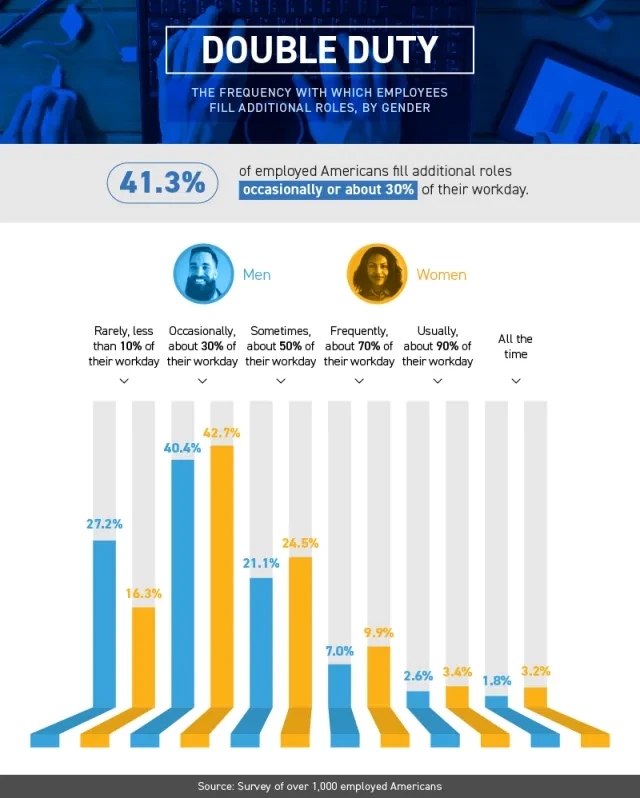
Most Americans are familiar with the expansion of their responsibilities to include extra tasks. In fact, more than 4 in 10 respondents said they spent about 30 percent of their workdays performing such additional tasks. Some said this work monopolized their time to an even greater extent. More than a fifth of both men and women claimed roughly half their working hours were spent this way. Worse still, 7 percent of men and nearly 10 percent of women said a staggering 70 percent of their time went to tasks unrelated to their job title.
Women were slightly more likely than men to spend their time on extra tasks, whether to a modest extent (such as 30 percent of their workday) or more extreme degree (90 percent of their time). In fact, men outpaced women in only one category: those who spent 10 percent or less of their time doing work unrelated to their official roles. Some researchers attribute this trend to culturally embedded inequalities. Women may feel less comfortable refusing requests to do more, lest they confirm negative stereotypes about their resilience.
Extra Work Ethic, by Industry
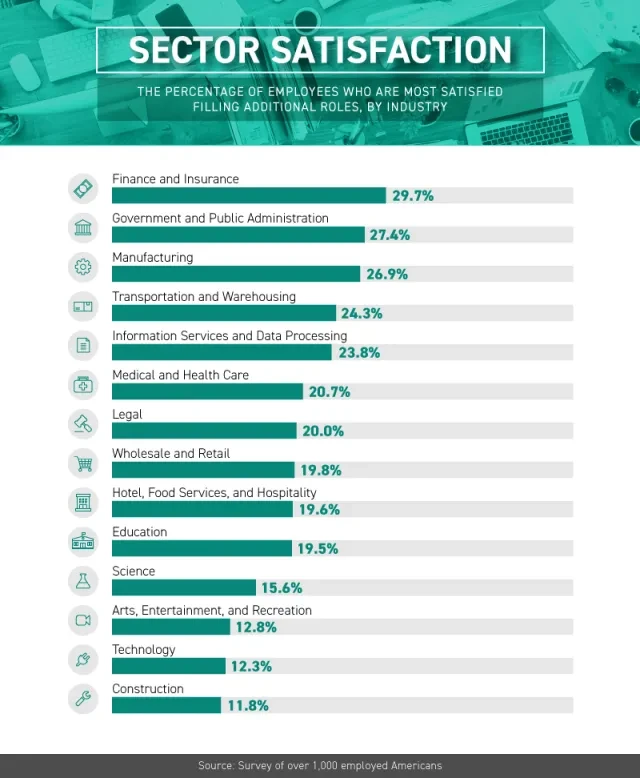
Not all workers grumble about assuming extra responsibilities. In fact, many derive satisfaction from work their roles don’t technically require, especially in certain industries. In finance and insurance, for instance, nearly 30 percent of workers expressed positive feelings associated with performing additional tasks. Similarly, more than a quarter of workers in government and manufacturing felt satisfaction about exceeding their official job requirements. However, it’s possible this enthusiasm for extra effort involves overtime pay – a lucrative reward for going the extra mile.
On the other end of the spectrum, just under 12 percent of construction professionals felt satisfied when their work went beyond their specified duties. Technology workers were nearly as frustrated by extra tasks in this regard, as were those in arts, entertainment, and recreation. Given the clear differences among these fields, our data suggests extra work can be unwelcome by employees, whatever their chosen profession.
Unofficial Obligations
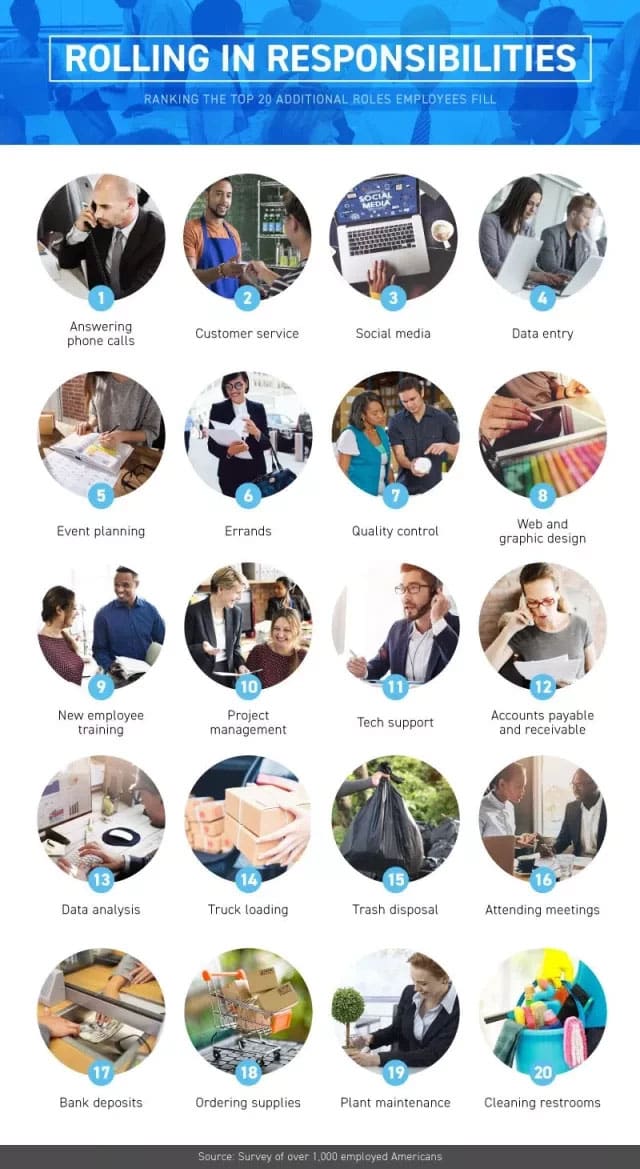
Given how prevalent extra work can be across industries, which additional tasks crop up most often? Our three most common responsibilities involved communication: answering phone calls, providing customer service, and managing social media. While the unanswered phone has plagued offices for decades (“Can somebody get that?”), the rise of social networks presents a relatively new responsibility. While a large company can hire a marketing agency to manage its social presence, small businesses may not yet have the resources to hire someone new to do it.
Some other common forms of extra work were clerical (data entry, accounts payable and receivable) or logistical (running errands, planning events). These duties are often quite time-consuming, and could quickly overwhelm workers who assume them in addition to their primary roles. Some other common additional roles seemed essentially important to any business, such as quality control or new employee training. Perhaps some businesses entrust senior employees with such integral functions, however full their plates may be already. This approach may not align well with the needs of younger employees, however: one recent survey found sufficient training and clear quality expectations were the two greatest concerns for millennials starting a new job.
Motives for Doing More
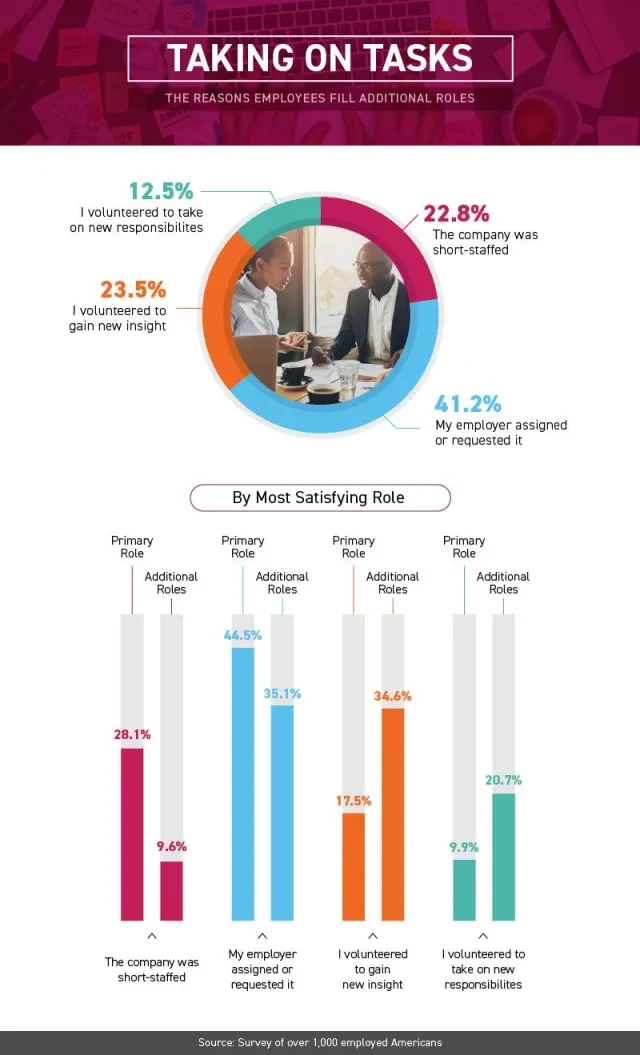
If employees’ feelings about extra tasks are mixed at best, why do they still agree to do them? The most common reason among respondents had little to do with their own initiative: Their bosses asked, or simply assigned new work to them. Personnel shortages were often a common cause: More than a fifth of participants said they felt obligated to step up because their company was short-staffed. However, nearly 18 percent of respondents jumped at the opportunity to gain new insights when accepting additional work. Another 10 percent said they volunteered to gain more responsibility – a move they might parlay into higher pay in the future.
As one might expect, motives correlated closely with whether participants liked their primary duties more than their extra tasks, or vice versa. While an employer request was the top reason in both cases, those who found their additional work more satisfying were significantly more likely to have volunteered to do it. Conversely, more than 28 percent of those who preferred their primary duties were forced into their expanded workload by a staffing shortage.
Right for the (Extra) Job?
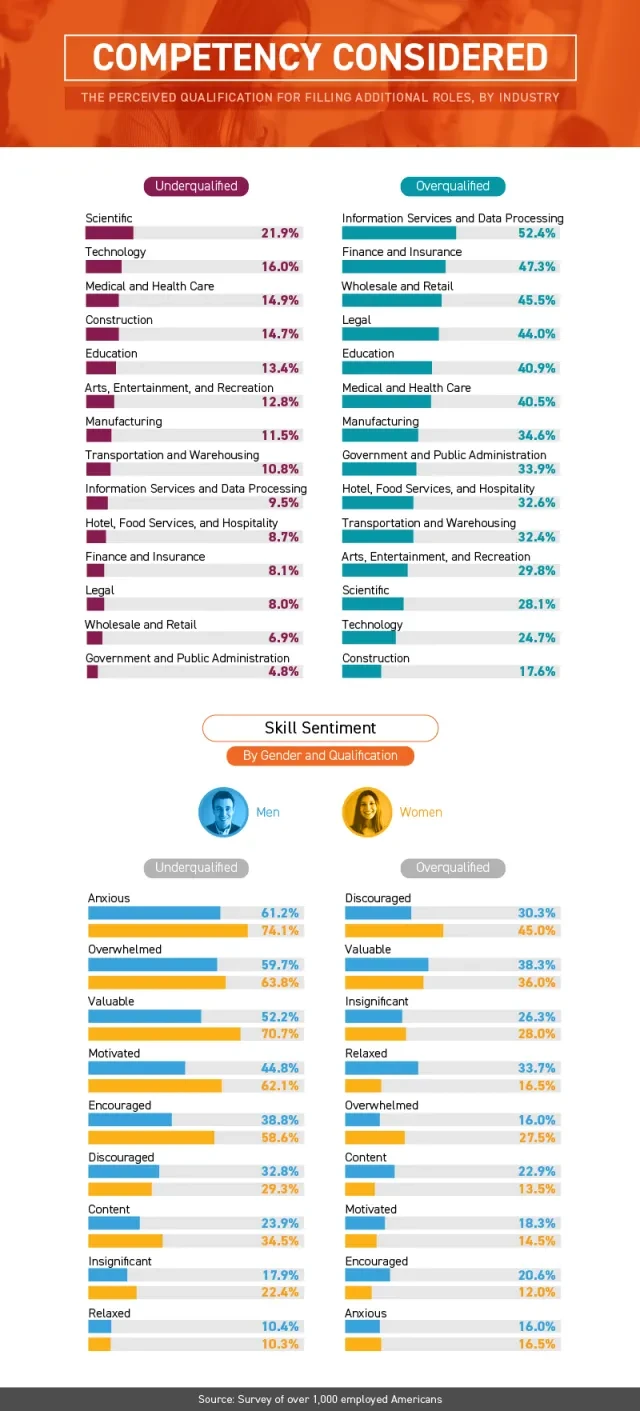
Depending upon one’s circumstances, the extra roles employees assume can either be painfully basic or frighteningly complex. In information services and data processing, along with finance and insurance, professionals were most likely to find their additional workload to be beneath their skill set. In science and technology, by contrast, a significant portion of professionals felt their unofficial roles exceeded their qualifications. Nearly 15 percent of medical health care workers said the same thing – a concerning fact for their patients.
Among those who felt unqualified for their additional responsibilities, anxiety was the most common sentiment for men and women alike. Similarly, a majority of both genders felt overwhelmed in these scenarios. Women were more likely than men to see the silver lining. However, nearly 71 percent of female respondents felt valuable in these situations, and over 62 percent felt motivated. In the overqualified camp, discouragement was far more likely. Yet many of them felt some upside, too, with more than 38 percent of men and 36 percent of women saying these menial tasks made them feel valuable.
Rewarding Above and Beyond
Our findings reveal both the challenges and opportunities inherent in doing work beyond one’s job description. For some, these additional roles are necessary evils, onerous, and obnoxious. Other workers view them as a means to gain relevant experience and earn their employers’ respect. If you own or operate a small business, it’s important to communicate clearly with regard to your expectations – and reward those who truly do more than what’s required. This clarity can prevent resentment among employees, and set performance ideals that will benefit your business.
If you’re a business owner or an HR professional, you probably spend plenty of time helping employees realize their potential and improve their efficiency. But your own workload doesn’t need to sag under the weight of administrative tasks, either. Whether your business is rapidly growing or just getting started, let Paychex handle your payroll and HR headaches. Our customized software solutions and unparalleled support can help you focus on your primary duty: building your business.
Methodology
Paychex collected data from over 1,000 employed Americans in November 2017. Approximately 54 percent of our participants were women, and 46 percent were men. The industry breakdowns of our participants were as follows: 5.2 percent in arts, entertainment, and recreation; 3.8 percent in construction; 16.5 percent in education; 8.2 percent in finance and insurance; 6.9 percent in government and public administration; 5.1 percent in hotel, food services, and hospitality; 4.7 percent in information services and data processing; 2.8 percent in legal; 5.8 percent in manufacturing; 13.4 percent in medical and health care; 3.5 percent in science; 9.0 percent in technology; 4.1 percent in transportation and warehousing; and 11.2 percent in wholesale and retail. The education breakdowns of our participants were as follows: 5.7 percent were high school graduates or equivalent (GED), 18.3 percent had some college credit but no degree, 9.4 percent had an associate degree, 45.1 percent had a bachelor’s degree, 15.7 percent had a master’s degree, 2.0 percent had a doctorate degree, and 3.7 percent had trade, technical, or vocational training.
Participants ranged in age from 18 to 64, with a mean of 35.3 and a standard deviation of 9.7 years. Demographic groups with less than 20 participants were excluded from individual analysis.
Sources
- https://hbr.org/2016/08/why-women-feel-more-stress-at-work
- https://money.usnews.com/money/blogs/outside-voices-careers/articles/2016-10-31/are-you-ready-for-the-new-overtime-laws
- https://clutch.co/agencies/social-media-marketing/resources/small-business-2017-survey#channels
- https://www.cnbc.com/2017/04/21/the-no-1-millennial-need-from-a-new-job-and-new-boss.html
Tags







